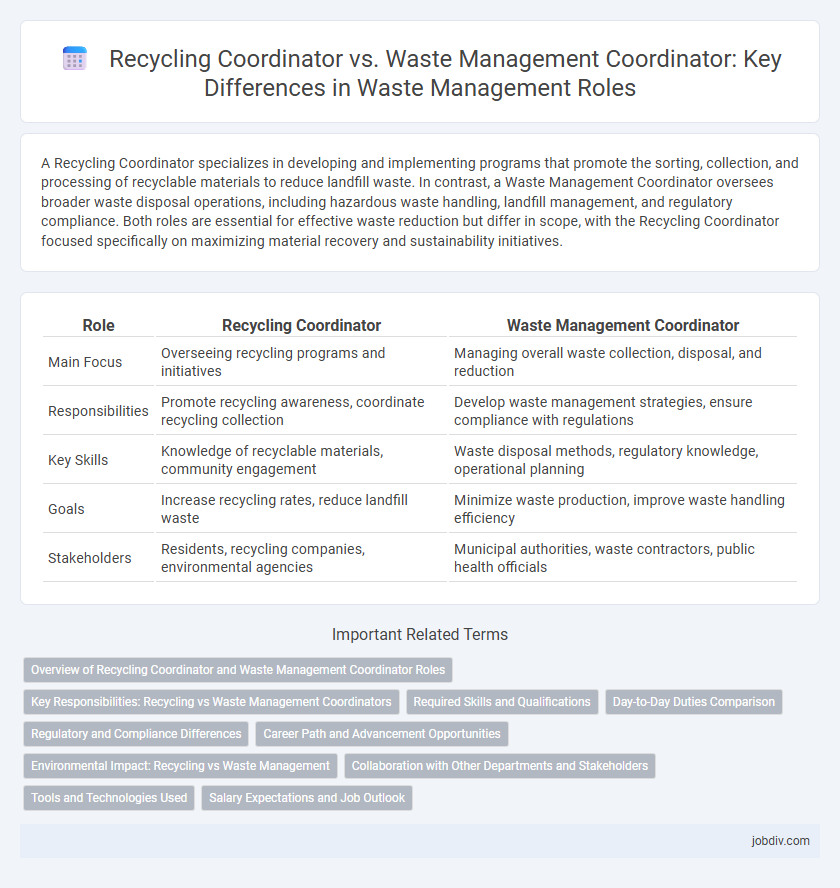A Recycling Coordinator specializes in developing and implementing programs that promote the sorting, collection, and processing of recyclable materials to reduce landfill waste. In contrast, a Waste Management Coordinator oversees broader waste disposal operations, including hazardous waste handling, landfill management, and regulatory compliance. Both roles are essential for effective waste reduction but differ in scope, with the Recycling Coordinator focused specifically on maximizing material recovery and sustainability initiatives.
Table of Comparison
| Role | Recycling Coordinator | Waste Management Coordinator |
|---|---|---|
| Main Focus | Overseeing recycling programs and initiatives | Managing overall waste collection, disposal, and reduction |
| Responsibilities | Promote recycling awareness, coordinate recycling collection | Develop waste management strategies, ensure compliance with regulations |
| Key Skills | Knowledge of recyclable materials, community engagement | Waste disposal methods, regulatory knowledge, operational planning |
| Goals | Increase recycling rates, reduce landfill waste | Minimize waste production, improve waste handling efficiency |
| Stakeholders | Residents, recycling companies, environmental agencies | Municipal authorities, waste contractors, public health officials |
Overview of Recycling Coordinator and Waste Management Coordinator Roles
Recycling Coordinators focus on developing and implementing programs that promote the collection, processing, and repurposing of recyclable materials to reduce landfill use. Waste Management Coordinators oversee the broader spectrum of waste disposal, ensuring compliance with environmental regulations and optimizing waste collection, treatment, and disposal methods. Both roles require strategic planning and community engagement but differ in their emphasis on recycling initiatives versus comprehensive waste system management.
Key Responsibilities: Recycling vs Waste Management Coordinators
Recycling Coordinators focus on developing and implementing programs to promote material recovery, educating communities on recycling best practices, and ensuring compliance with local recycling regulations. Waste Management Coordinators oversee waste collection, disposal, and treatment processes, managing landfill operations and hazardous waste protocols to minimize environmental impact. Both roles require collaboration with municipal agencies, but Recycling Coordinators emphasize resource recovery while Waste Management Coordinators prioritize overall waste reduction and regulatory compliance.
Required Skills and Qualifications
A Recycling Coordinator requires expertise in materials recovery processes, community engagement, and regulatory compliance related to recycling programs, often holding certifications like Certified Recycling Professional (CRP). A Waste Management Coordinator focuses on waste disposal strategies, hazardous waste handling, and environmental regulations, typically needing knowledge of waste treatment technologies and permits. Both roles demand strong organizational skills, data analysis capabilities, and effective communication to implement sustainable waste solutions.
Day-to-Day Duties Comparison
Recycling Coordinators manage the collection, sorting, and processing of recyclable materials, ensuring compliance with environmental regulations and promoting recycling programs within communities or organizations. Waste Management Coordinators oversee the overall waste disposal process, including hazardous waste handling, landfill operations, and waste reduction strategies to minimize environmental impact. Both roles require coordination with vendors, reporting on waste metrics, and implementing sustainability initiatives, but Recycling Coordinators focus more on resource recovery, while Waste Management Coordinators address broader waste disposal challenges.
Regulatory and Compliance Differences
Recycling Coordinators focus on ensuring that recycling programs comply with local, state, and federal recycling regulations, emphasizing waste diversion and material recovery standards. Waste Management Coordinators oversee broader waste disposal measures, ensuring adherence to hazardous waste regulations, landfill permits, and environmental protection laws. Regulatory compliance for Recycling Coordinators centers on circular economy policies, whereas Waste Management Coordinators prioritize landfill management and hazardous waste handling protocols.
Career Path and Advancement Opportunities
Recycling Coordinators specialize in developing and implementing programs that promote the efficient reuse and repurposing of materials, offering career advancement through roles in environmental education, sustainability consulting, and government policy advisory. Waste Management Coordinators oversee broader waste handling processes, including collection, disposal, and regulatory compliance, with career growth leading to senior management positions in solid waste facilities, environmental health sectors, or corporate sustainability departments. Both paths provide opportunities for advancement into leadership roles, but Recycling Coordinators tend to focus on circular economy initiatives while Waste Management Coordinators gain expertise in comprehensive waste systems and regulatory frameworks.
Environmental Impact: Recycling vs Waste Management
A Recycling Coordinator focuses on maximizing material recovery to reduce landfill use and lower greenhouse gas emissions by promoting recycling programs and educating the public. In contrast, a Waste Management Coordinator manages the entire waste lifecycle, including collection, disposal, and treatment, aiming to minimize environmental pollution and ensure regulatory compliance. Both roles contribute to sustainability, but the Recycling Coordinator directly impacts resource conservation, while the Waste Management Coordinator oversees broader waste reduction and environmental protection strategies.
Collaboration with Other Departments and Stakeholders
A Recycling Coordinator collaborates closely with environmental teams, community organizations, and local governments to develop sustainable recycling programs, enhancing resource recovery and reducing landfill waste. In contrast, a Waste Management Coordinator works with multiple departments such as sanitation, facilities, and regulatory agencies to oversee comprehensive waste collection, disposal, and compliance strategies. Both roles require effective communication and coordination with external contractors and stakeholders to optimize waste diversion and promote environmental responsibility.
Tools and Technologies Used
Recycling Coordinators utilize specialized software for tracking recyclable materials and sorting technologies like optical sorters to enhance material recovery rates. Waste Management Coordinators deploy comprehensive waste tracking systems, GIS mapping tools, and advanced fleet management software to optimize collection routes and waste disposal processes. Both roles increasingly incorporate IoT sensors and data analytics platforms to monitor waste streams and improve operational efficiency.
Salary Expectations and Job Outlook
Recycling Coordinators typically earn between $45,000 and $60,000 annually, with roles emphasizing sustainable material recovery and community education, while Waste Management Coordinators command salaries ranging from $50,000 to $70,000, reflecting broader responsibilities in waste disposal and regulatory compliance. Job outlook for Recycling Coordinators is growing at a faster rate due to increasing environmental regulations and corporate sustainability goals, whereas Waste Management Coordinators experience steady demand driven by ongoing municipal and industrial waste needs. Geographic location, employer type, and level of experience significantly influence salary variations and career advancement opportunities in both positions.
Recycling Coordinator vs Waste Management Coordinator Infographic

 jobdiv.com
jobdiv.com